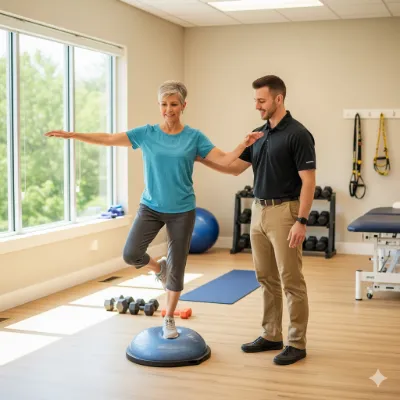
Vestibular Therapy for Vertigo: Regain Balance, Reduce Dizziness, and Improve Your Quality of Life
Imagine waking up in the morning, standing up, and suddenly the room feels like it’s spinning. You reach out for support, afraid of falling. This is what living with vertigo feels like for millions of people. Vertigo isn’t just mild dizziness—it can be a disabling condition that disrupts work, exercise, driving, and even simple daily tasks like cooking or walking.
Fortunately, there is a safe, non-invasive treatment option: vestibular therapy. At NJ Rehab Experts, we specialize in vestibular rehabilitation therapy (VRT) for patients across New Jersey who are struggling with dizziness, balance issues, and vertigo. With personalized exercises and targeted rehabilitation techniques, we help patients retrain their brains, restore balance, and reclaim their independence.
What Is Vestibular Therapy?
Vestibular therapy, or vestibular rehabilitation therapy, is a specialized form of physical therapy that focuses on treating inner ear and balance disorders. The vestibular system—located in the inner ear—controls balance, spatial orientation, and stability. When this system is disrupted, patients may experience vertigo, dizziness, unsteady gait, blurred vision, or nausea.
Vestibular therapy works by using specific head, body, and eye exercises to reduce these symptoms. Unlike medications, which only mask dizziness, vestibular therapy addresses the underlying dysfunction to provide long-term relief.

Understanding Vertigo and Its Impact
Vertigo is a sensation that you or your surroundings are moving or spinning, even when still. It’s more than occasional dizziness—it can significantly affect quality of life.
Symptoms of Vertigo Include:
A spinning or tilting sensation
Unsteadiness and difficulty walking
Sudden loss of balance, especially in dark or crowded spaces
Blurred or “jumping” vision
Nausea, motion sickness, or vomiting
Anxiety and fear of falling
Daily Life Challenges Caused by Vertigo
Patients with vertigo often avoid activities they enjoy due to fear of dizziness. Driving, cooking, going to work, or even walking through the grocery store can feel overwhelming. In seniors, vertigo also increases the risk of falls and injuries, making timely treatment crucial.
Common Conditions Treated with Vestibular Therapy
Vestibular therapy is highly effective for a wide range of balance and dizziness disorders, including:
Benign Paroxysmal Positional Vertigo (BPPV): The most common type of vertigo, caused by displaced calcium crystals in the inner ear.
Vestibular Neuritis or Labyrinthitis: Inflammation of the vestibular nerve leading to sudden dizziness, nausea, and imbalance.
Meniere’s Disease: A chronic inner ear disorder causing vertigo episodes, hearing loss, and tinnitus.
Post-Concussion Dizziness: Many patients experience dizziness and unsteadiness after a head injury.
Chronic Dizziness or Imbalance in Seniors: Age-related vestibular decline makes older adults more prone to falls.
Vestibular Hypofunction: A condition where the inner ear doesn’t function properly, leading to chronic dizziness.

How Vestibular Therapy Works
At NJ Rehab Experts, vestibular therapy is customized to each patient’s needs. Common techniques include:
1. Canalith Repositioning Maneuvers (for BPPV)
Movements like the Epley maneuver reposition displaced inner ear crystals, often providing immediate relief from vertigo.
2. Gaze Stabilization Exercises
These exercises improve control of eye movements, helping patients see clearly while moving their heads.
3. Balance Training
Customized exercises retrain the body to maintain stability during walking, standing, or sudden movements.
4. Habituation Exercises
Repeated, gentle exposure to dizziness-triggering movements helps the brain adapt, reducing symptoms over time.
5. Functional Training
Practical activities that mimic real-life scenarios, such as bending down, turning quickly, or walking in crowded spaces.
Benefits of Vestibular Therapy for Vertigo Patients
Drug-free and non-invasive: No side effects from medications.
Quick relief: BPPV patients often feel better within 1–2 sessions.
Improved safety: Reduced fall risk, especially in seniors.
Restored confidence: Patients return to driving, exercising, and daily activities.
Personalized care: Every plan is customized based on symptoms and lifestyle.
Long-lasting improvement: Therapy retrains the brain for lasting results.
What to Expect at NJ Rehab Experts
Step 1: Comprehensive Evaluation
Your therapist will assess your symptoms, eye movements, balance, and walking pattern.
Step 2: Personalized Treatment Plan
A program tailored to your diagnosis and lifestyle goals.
Step 3: Hands-On Treatment
Including repositioning maneuvers, exercises, and real-time feedback.
Step 4: Home Exercise Program
Simple, safe exercises to continue progress between visits.
Step 5: Long-Term Progress Monitoring
We track improvements and adjust your plan to ensure long-term recovery.
Practical Tips for Managing Vertigo at Home
Rise slowly from sitting or lying positions.
Use night lights to avoid falls in the dark.
Stay hydrated, as dehydration worsens dizziness.
Avoid alcohol and excessive caffeine, which affect inner ear function.
Follow your therapist’s home exercise plan consistently.
Why Choose NJ Rehab Experts for Vestibular Therapy?
Experienced team specializing in vestibular disorders
Cutting-edge techniques like the Epley maneuver and balance retraining
Patient-first approach with compassionate care
Convenient New Jersey location for local patients
Proven results helping patients reduce dizziness and regain independence
FAQs About Vestibular Therapy
Q1: How long does vestibular therapy take?
Some patients, especially with BPPV, experience relief in 1–2 sessions. Chronic conditions may require several weeks of therapy.
Q2: Is vestibular therapy safe for seniors?
Yes. Exercises are gentle, low-impact, and designed to prevent falls.
Q3: Can vestibular therapy cure vertigo completely?
For many conditions like BPPV, yes. For others, it significantly reduces frequency and severity.
Q4: Do I need a doctor’s referral?
Most patients can begin therapy directly, though insurance may require a referral.
Q5: Will the dizziness come back?
Some patients may have recurring symptoms, but therapy provides tools to manage and reduce them.
Take Control of Your Balance Today
Don’t let dizziness hold you back. With vestibular therapy at NJ Rehab Experts, you can regain balance, reduce vertigo, and return to the activities you love.
Contact NJ Rehab Experts today to schedule your vestibular therapy consultation in New Jersey.
